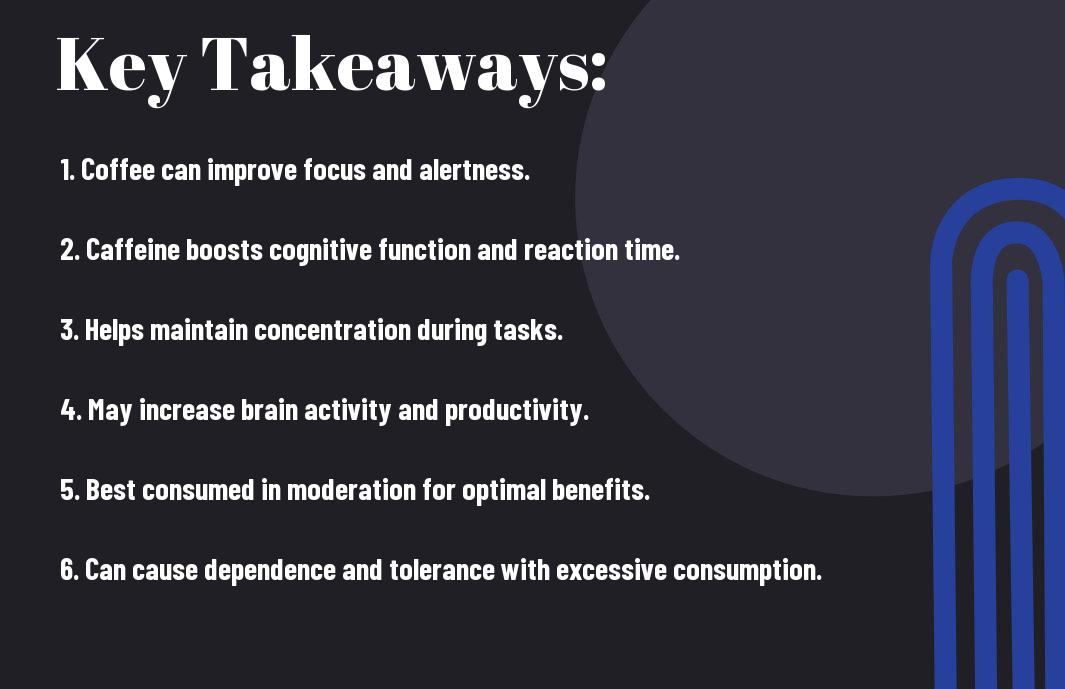You might have noticed that a cup of coffee can work wonders when you need to focus on a task. But have you ever wondered why that is? Let’s investigate the science behind how caffeine, found in coffee, affects your ability to concentrate. According to Better Health Victoria, caffeine can improve alertness, attention, and concentration by blocking adenosine, a neurotransmitter that can make you feel sleepy.
Key Takeaways:
- Caffeine boosts alertness: Coffee contains caffeine which helps in increasing alertness and improving concentration levels.
- Enhanced cognitive functions: Consuming coffee can lead to improved cognitive functions, such as better memory retention and faster reaction times.
- Focus and attention: Coffee can help in enhancing focus and attention span, making it easier to concentrate on tasks for a longer duration.
- Moderation is key: While coffee can have positive effects on concentration, excessive consumption can lead to restlessness and jitteriness, affecting focus negatively.
- Individual differences: The impact of coffee on concentration may vary from person to person, with factors like tolerance levels and metabolism playing a role in how caffeine affects focus.
The Science Behind Caffeine
How Caffeine Works in the Brain
One of the key reasons why caffeine is so effective at boosting concentration is its ability to block adenosine receptors in the brain. Adenosine is a neurotransmitter that promotes relaxation and drowsiness. By inhibiting adenosine’s actions, caffeine helps to keep you alert and focused, making it easier to concentrate on tasks at hand.
The Role of Adenosine and Dopamine
With continued caffeine consumption, the brain responds by producing more adenosine receptors. This means that over time, you may need to consume larger amounts of caffeine to achieve the same level of alertness and concentration. On the flip side, caffeine also stimulates the release of dopamine, a neurotransmitter associated with pleasure and reward. This dual action of blocking adenosine and increasing dopamine levels can contribute to the feelings of improved mood and focus that many coffee drinkers experience.
Adenosine receptors play a crucial role in regulating sleep-wake cycles in the brain. By interfering with adenosine’s actions, caffeine disrupts this natural process, helping you stay awake and alert. However, it’s vital to be mindful of the potential side effects of consuming too much caffeine, such as jitteriness, increased heart rate, and difficulty sleeping.


The Effects of Caffeine on Concentration
Even though caffeine is a stimulant that is found in coffee, tea, and various energy drinks, it has several effects on the brain that can improve concentration and cognitive function. Understanding the impact of caffeine on these cognitive functions can help individuals strategically use it to enhance their focus and productivity.
Increased Alertness and Focus
Any consumption of caffeine can lead to increased alertness and improved focus. Caffeine works by blocking adenosine, a neurotransmitter that promotes sleep, which in turn leads to heightened neural activity. As a result, individuals often experience a boost in energy and attentiveness, making it easier to concentrate on tasks at hand.
Improved Reaction Time and Attention
To further enhance concentration, caffeine has been shown to improve reaction time and attention span. Studies have demonstrated that individuals who consume caffeine are able to process information more quickly and maintain a higher level of focus for extended periods. This can be particularly beneficial when engaging in tasks that require quick thinking and sustained attention.
Reaction times are significantly faster when individuals have consumed caffeine, allowing them to respond more swiftly to stimuli in their environment. Additionally, attention to detail is often heightened, leading to improved performance on tasks that demand precision and accuracy.
Enhanced Memory and Learning
With regular consumption of caffeine, individuals may also experience enhancements in memory and learning capabilities. Caffeine has been found to positively impact certain areas of the brain responsible for memory retention and cognitive processing, leading to improved information recall and learning retention.
This cognitive enhancement can be particularly advantageous in academic or work settings where the ability to absorb and retain new information is crucial for success. By incorporating caffeine into their routine, individuals may find themselves more adept at grasping complex concepts and recalling important details.

The Optimal Amount of Caffeine for Concentration
The Ideal Dosage for Cognitive Function
Now, let’s talk about caffeine and its ideal dosage for enhancing cognitive function and concentration. Studies have shown that a moderate amount of caffeine can have a positive effect on alertness, focus, and overall mental performance. The optimal amount of caffeine for most people is around 100-200 milligrams, which is roughly one to two cups of coffee.
How Individual Tolerance Affects Caffeine’s Impact
Tolerance to caffeine varies from person to person and can greatly affect how caffeine impacts concentration. Some individuals may be more sensitive to caffeine and experience jitters, anxiety, or difficulty concentrating even with small amounts. On the other hand, regular coffee drinkers may develop a tolerance to caffeine, requiring higher doses to achieve the same cognitive-enhancing effects.
Understanding your own tolerance to caffeine is crucial in optimizing its effects on concentration. It’s important to pay attention to how your body reacts to different amounts of caffeine and adjust your intake accordingly. Consulting with a healthcare provider or a nutritionist can also provide personalized recommendations based on your individual tolerance levels.
The Dark Side of Caffeine: Negative Effects on Concentration
Jitters, Anxiety, and Distraction
Anxiety and jitters are common side effects of consuming too much caffeine. While a small amount of caffeine can boost alertness and concentration, excessive intake can lead to feelings of restlessness, nervousness, and anxiety. These symptoms can actually impair concentration and focus, making it difficult to stay on task and effectively complete work or study-related activities. Additionally, the jittery feeling can lead to physical manifestations like fidgeting or tapping, further distracting from the task at hand.
Insomnia and Disrupted Sleep Patterns
The consumption of caffeine, especially later in the day, can interfere with sleep patterns and contribute to insomnia. Lack of adequate sleep can have a significant impact on concentration levels and cognitive function. It can lead to fatigue, irritability, and difficulties in focusing and processing information. Over time, chronic sleep disturbances caused by caffeine intake can have a cumulative negative effect on overall concentration and productivity.
The key lies in moderation and timing when consuming caffeine. It’s important to be mindful of how much caffeine you’re consuming and when you’re consuming it to avoid disrupting your sleep patterns and affecting your concentration levels negatively.
Dependence and Withdrawal Symptoms
Dependence on caffeine can develop when it is consumed regularly and in high quantities. This can lead to withdrawal symptoms when caffeine intake is reduced or stopped abruptly. These symptoms, such as headaches, fatigue, irritability, and difficulty concentrating, can be severe and impact daily functioning. The need for caffeine to function optimally can create a cycle of dependence that is hard to break.
For instance, relying on caffeinated beverages to get through the day can lead to a vicious cycle of dependence that ultimately hinders rather than enhances concentration and focus. It’s crucial to be mindful of your caffeine consumption and make conscious choices to avoid developing a reliance on it for cognitive performance.
Coffee vs. Other Stimulants: A Comparison
Not all stimulants are created equal when it comes to their impact on concentration. Let’s take a closer look at how coffee stacks up against other popular stimulants.
| Coffee | Other Stimulants |
| Coffee contains caffeine, which is known to enhance alertness and concentration. | Other stimulants like energy drinks and nicotine also have stimulating effects on the brain. |
| Consuming coffee in moderate amounts can improve cognitive functions and help maintain focus. | Other stimulants may have varying effects on concentration levels and could lead to jitteriness or other side effects. |
Energy Drinks and Their Impact on Concentration
Their high caffeine content can provide a quick jolt of energy, but the effects of energy drinks on concentration may be short-lived. While they can temporarily boost alertness, excessive consumption may result in a crash, leaving individuals feeling more fatigued than before.
The Effects of Nicotine and Other Stimulants
Stimulants like nicotine, found in cigarettes and e-cigarettes, can also influence concentration levels. While nicotine may initially enhance focus, it can be addictive and lead to dependency, impacting overall cognitive function in the long run. Other stimulants like amphetamines may have more potent effects but come with a higher risk of side effects and potential addiction.
This comparison underscores the importance of understanding the varying impacts of different stimulants on concentration and overall cognitive function. While coffee can be a reliable choice for enhancing focus and alertness, it’s important to consider its effects in comparison to other stimulants and make informed choices based on individual preferences and tolerances.
Coffee Consumption Habits and Concentration
The Impact of Morning Coffee on Daily Productivity
Productivity can often be linked to the morning ritual of consuming a cup of coffee. Many individuals rely on that first cup of joe to kickstart their day and enhance their focus and alertness. The caffeine in coffee works as a stimulant, increasing dopamine levels in the brain, which can improve mood and cognitive functions. Studies have shown that moderate coffee consumption in the morning can positively impact daily productivity levels.
How Afternoon Coffee Breaks Affect Focus
With the midday slump being a common occurrence, many turn to coffee as a way to regain focus and concentration. Afternoon coffee breaks can provide a much-needed energy boost to combat fatigue and improve mental alertness. The caffeine in coffee blocks adenosine, a neurotransmitter responsible for promoting sleep, which helps individuals stay more awake and attentive.
Another benefit of afternoon coffee breaks is the social aspect it brings to the workplace. Taking a coffee break with colleagues can foster a sense of community and collaboration, which can ultimately enhance productivity and creativity.
The Role of Coffee in Creative Work and Problem-Solving
Coffee has long been associated with creative work and problem-solving. The heightened state of alertness and improved focus that caffeine provides can aid individuals in tackling complex tasks and thinking more critically. Many artists, writers, and professionals in creative fields swear by their coffee consumption as a way to stimulate their creativity and enhance their problem-solving skills.
Focus is important when it comes to creative work and problem-solving, and coffee can help individuals maintain that focus for longer periods. The temporary cognitive boost that caffeine offers can be just what is needed to overcome creative blocks and find innovative solutions to challenges.
Conclusion
With this in mind, it’s clear that coffee can have a positive impact on concentration levels. The caffeine in coffee stimulates the brain and helps improve focus and alertness, making it a popular choice for many individuals looking to boost their productivity. However, it’s important to consume coffee in moderation, as excessive intake can lead to negative side effects such as jitteriness and increased heart rate.
To further explore the effects of coffee on focus and productivity, you can read more about it in Equalman’s article “Does Coffee Help or Hurt Focus & Productivity?“. Whether you’re a coffee enthusiast or someone looking to enhance your concentration, understanding the benefits and limitations of coffee consumption can help you make informed decisions for your daily routines.
FAQ
Q: How does coffee affect concentration?
A: Coffee can improve concentration by blocking adenosine, a neurotransmitter that promotes sleep and relaxation, and by increasing the levels of dopamine and norepinephrine, which enhance focus and alertness.
Q: What is adenosine and how does coffee block it?
A: Adenosine is a neurotransmitter that promotes sleep and relaxation. Caffeine in coffee blocks adenosine receptors in the brain, preventing its calming effects and keeping you alert.
Q: Can drinking too much coffee negatively impact concentration?
A: Yes, excessive coffee consumption can lead to jitteriness, anxiety, and disrupted sleep patterns, which can all impair concentration levels.
Q: How long does it take for coffee to improve concentration after consumption?
A: The effects of caffeine in coffee are usually felt within 15 to 45 minutes after consumption, with peak levels in the bloodstream occurring around 30 minutes to 2 hours post-ingestion.
Q: Are there any long-term effects of drinking coffee on concentration?
A: Regular coffee consumption in moderate amounts is generally considered safe and can even have long-term cognitive benefits, such as improved focus and attention span.
Q: Can everyone benefit from coffee’s ability to enhance concentration?
A: Individuals vary in their sensitivity to caffeine, so while some people may experience heightened concentration, others may feel restless or experience negative side effects that outweigh the benefits.
Q: Are there any alternative ways to improve concentration without relying on coffee?
A: Yes, maintaining a balanced diet, staying hydrated, engaging in regular physical activity, practicing mindfulness and meditation, and getting an adequate amount of sleep are all natural ways to enhance concentration without relying on caffeine.





